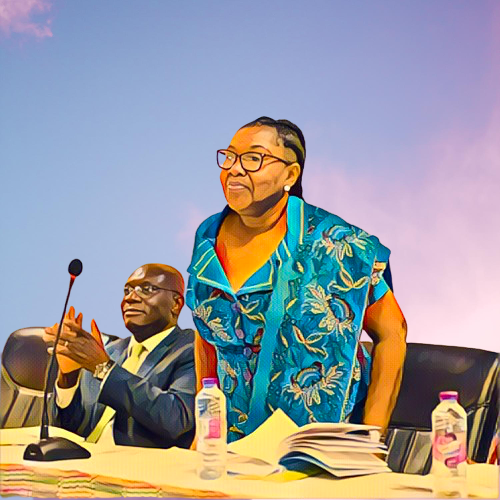In an important meeting with the Gbese Clan in Accra, Yvonne Odoley Sowah, the Chairperson of the Greater Accra Regional Lands Commission, underscored the critical need for discipline among the youth to prevent land disputes and foster area development. This interaction, which took place at the Gbese Mantse Palace, highlighted several ongoing issues, including unauthorized church activities in the Achimota forest and irregular sale of government lands.
Yvonne Odoley Sowah’s call to the caretakers and leaders of the Gbese Clan was clear and assertive. She emphasized the importance of managing land affairs legitimately and peacefully, specifically urging the younger generation to refrain from engaging in land sales that frequently lead to conflicts. According to Ms. Sowah, many of the land disputes arise from misconceptions held by the youth, who often believe they have inherited rights over lands owned by their ancestors. This misunderstanding can lead to litigation and hinder the overall development of the area.
The discussions with Gbese traditional leaders touched upon several pressing issues. The unauthorized operation of churches within the Achimota forest was a particular concern, as was the sale of government lands to private individuals without proper authority. The meeting also covered the challenges of land registration within traditional and administrative boundaries, acquisition of land titles without proper documentation, and the forgery of signatures of deceased chiefs, which complicates the determination of true land ownership.
In her address, Ms. Sowah commended the Gbese Stool for their proactive measures in authenticating documents for the 104 villages under their jurisdiction, where lands were being sold illegally by some families and individuals. She noted that the signatures and site plans provided by the Gbese Paramount Stool would facilitate the Lands Commission’s efforts in verifying land ownership going forward.
Moreover, Ms. Sowah discussed the complexities involved in amending the Executive Instrument for the release of government lands, which is a challenging process. She urged the traditional authority to consider a payment plan for their lands, given the government’s limited financial capacity to offer compensation. Additionally, she advised that any lands released should be sent to the Spatial Planning Department for proper layout to prevent these areas from devolving into slums.
On a broader community level, Nii Ayi Bonte II, the Gbese Mantse, shared that the Gbese Stool was actively seeking funds to support the education of children in the area. He explained that the funds raised from the sale of Gbese lands would be directed towards this noble cause. This initiative is part of a larger effort by various stakeholders, including traditional authorities, to supplement the government’s role in education, acknowledging that the responsibility of educating every child cannot fall on the government alone.
This meeting not only addressed the immediate issues of land disputes and their prevention but also delved into the larger implications of land management for community development and education. The proactive stance of the Gbese Clan and the Lands Commission in these matters serves as a model for other communities facing similar challenges. The ongoing collaboration between traditional authorities and governmental bodies is crucial for the sustainable development of communities and the nurturing of future generations.
The discussions and outcomes of this meeting show the importance of leadership, community involvement, and structured planning in addressing and resolving complex issues such as land disputes. By focusing on discipline, legitimate dealings, and proactive measures, the leaders of the Gbese Clan, in collaboration with the Lands Commission, are setting a strong foundation for the continued growth and development of their community.
Source: Graphic Online




